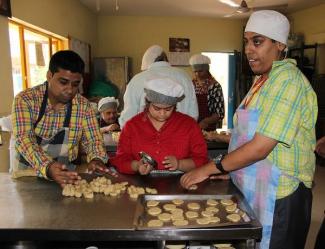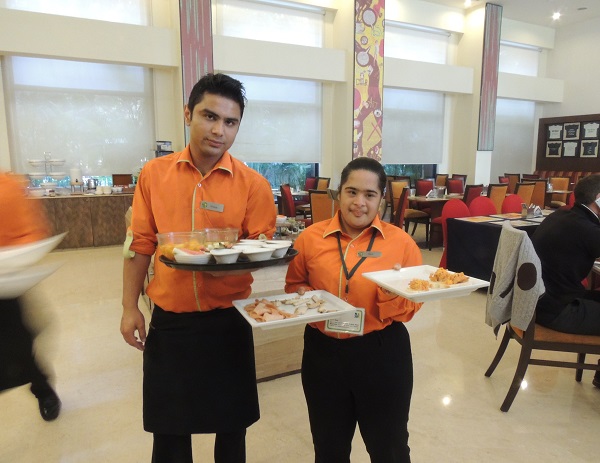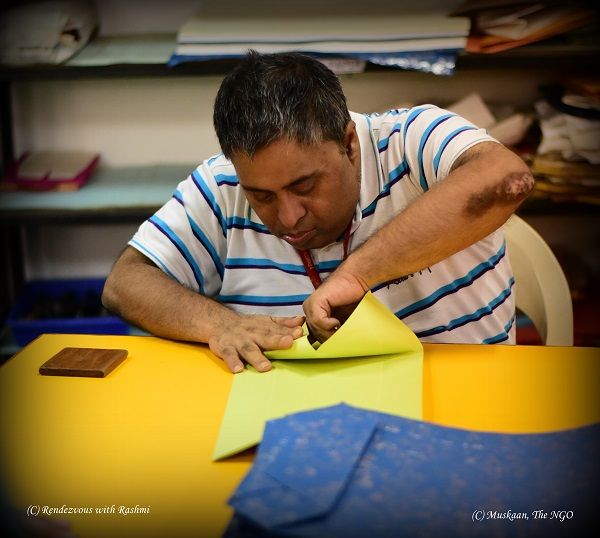
Mrs Neera Chawla, Director of Muskaan, an NGO which strives to empower adults with disabilities, talks about their employment programmes and how they try to make inclusion a reality.
What categories of disabilities does Muskaan work with? What are the programmes you offer?
We primarily work with adults who have intellectual disabilities and multiple disabilities. We have a few cases of Autism also.
We mostly have adult training programmes, which are ascertained according to the different degrees of support required by them. For individuals with high support needs, we have an Art and Activity centre. This programme gives them exposure to various art and craft activities, which act as therapy for them and through which they can express and empower themselves at various levels. If a person manages to gradually get over this high support need with adequate training, then she/he can go for vocational training.
For others, we have a vocational training programme which prepares one for employment inside Muskaan or even outside. There are usually 4 levels of vocational training. The 4th level, called employability training, prepares one for employment. We also have a computer training programme. We have a batch completing the course in Data Entry, which has also been made an integral part of our vocational training.
We conduct training programmes for life skills, sports and physical fitness, as well as therapy programmes for physiotherapy and occupational therapy. Our recreational activities include in-house activities like festival celebrations, fun games and visits to different places.
We have a residential facility at a different location, near Chattarpur. Eighteen young adults live there and are trained to do things on their own, which we consider a definite achievement in terms of the success of the programme.
Please tell us about your employment centre and the vocational training imparted.
We started the vocational training centre way back in 1989. At that time, we had no model to follow, in terms of training etc. We created our own training and supported work centre models. The main idea behind the supported work centre was that they would work and earn also. We have realised that the importance of a work centre is two-fold: first, that the majority needs a supportive work centre. Secondly, the outside world is very challenging, and not everybody can meet those challenges, specially as the challenges also keep changing everyday. 15 - 20 percent can go out and work. The rest depend heavily on an internal employment centre, where they can work comfortably and get paid also. The last four years have, of course, seen major breakthroughs in this sphere. Hospitality is the major sector which have employed the maximum persons with disabilities. From Muskaan, 28 placements have taken place, 4 in petrol pumps and the rest in hotels.
Why do you think employment is important for people with disabilities? Can you give examples?
Any kind of work or service is important for any human being. Adulthood is the longest period of our life. If we do not have a meaningful engagement, if we cannot contribute to society, we tend to feel frustrated. It is exactly the same with people with disabilities. And more so, because they are capable of becoming contributing members of the society. They are usually very sincere workers who take a lot of pride in their work. Outside placements have proved that. One reason why companies are showing keenness to hire them is they are very focussed in whatever they do. The other reason is the low attrition rate. So the company feels it can retain them. When they were hired from Muskaan, companies came and observed how they worked in our supported work centre. And they found quality, sincerity and an overall happiness in the work. Which is why the companies decided to give them opportunities. This is wherein lies the importance of the supportive work centres. Over time, we have seen how persons with disabilities have matured in their work places to become responsible employees. They value their work like anything. Some have even picked up sign language for the benefits of some of their colleagues, who are hearing impaired.
Do you have programmes tailored for each age group? Is there a particular age group that you specifically train for the employment sector?
We usually start at age 16, and for younger age groups, families are also provided counselling and guidance. For the employment sector, the ideal age group that we train is between 20 to 35 years. Below 20, we feel, they would be too young to handle the pressure.
And for the above 35 age group, a challenging environment often becomes difficult to tackle, which is why we do not like to stress this age group much. We also have designed some senior age programmes for those above 45 years.
How did you start with your employment programme?
In 1995, when our first batch got ready for work, we started looking for employment opportunities but in vain. We had clarity that without providing meaningful work to our trained graduates, there is no meaning in continuing to churn out batches after batches. We decided to start our own work centre as we had confidence that they can work and contribute to the society. We chose consumable products which they could make and there was also market demand for these products. We continued searching and placing few students in outside world also but we realised that lack of awareness creates many challenges for them.
Please share with us about the Lemon tree initiative? What adaptations did you need to do to equip people to be employable?
Lemon Tree (pic below) put in intensive efforts to employ persons with disabilities. In fact, it is a part of their HR initiative. We start with sensitisation of their HODs, Managers, & Employees. Job mapping has to be done for each role and few adaptations within the role are to be made. We develop some adaptations/ solutions so that our students can work there with minimum supervision. We provide the initial training to all those who are selected. We are also the partners for training them on the job. We are there on the premises to support them always. Plus, we have continuous reviews of how they cope with the situations. The sensitisation and re-sensitisation is a continuous process as employees keep on changing.

Are there other organisations that you work with? How has the experience been?
Yes, now we are working with Four Points, and also with the Carlson group. These companies are also encouraging placements with us. We have, till date, worked with 5 Lemon Tree hotels, so naturally the experience with them has been more extensive. The others did not have ao much clarity in their vision of employing persons with disabilities which had initially started off as a CSR activity. But we have seen that we need to have a continuous dialogue with the employers on equal rights etc., before the employer picks up the cues.
What reasonable accommodations do organisations need to make to employ people with intellectual disabilities?
The hospitality industry works in shifts and even petrol pumps have shifts. There are certain accommodations which these companies make for employing persons with disabilities. They are exempted from working on night shifts. All companies have agreed to that. But the number of working hours remains the same and the travel arrangements are usually made by the family. But we always tell the company that each job involves various tasks and that these employees should not be expected to perform every little chore. There will always be a few jobs which will remain outside their purview. For instance, they are likely to perform all the duties at a hotel coffee shop, except for taking orders, as communication with the guest might be a problem. The second thing they will, in all likelihood, have a problem with, is preparing the bill. Yet another problem they usually face at work places is scheduling or a long sequencing of tasks. To counter this, they have started a ME book, a pictorial sequencing of all the chores they are supposed to perform. They usually follow that, so no one has to remind them of their duties. It is a spiral bound book, leading them towards independence. We do the pictorial sequencing for them, which they actually only need in the initial stages. The rest they pick up from visual cues in the environment.
Please share with us a couple of individual experiences that would be inspiring to others.
Vineet Dewan (pic below) has been trained at Muskaan in various vocational skills but he found his niche in Block Printing and making Paper Bags. He has been working in our stationary unit for more than 10 years now and is the Master Block Printer. His work shows his skill for perfection. He has leadership quality and inspires others to follow him with ease.

Bani Mago got her training at Muskaan and is now employed at Lemon Tree Hotel, Gurgaon (pic above). Bani takes time to mingle with others but once she forms a rapport then she opens up with that person.. She learns any new task quickly. She had initial difficulties in mingling with team at Lemon tree as there were no female employees in her cafe. But gradually she has formed friendships with many people and now she enjoys doing her work. According to her Manager she is a very responsible and conscientious employee.
What do you really understand by inclusiveness? How does Muskaan aim to continue with its programme?
When we say inclusion, we mean inclusion in every situation in life. Inclusion as in also being the equal family member. We need to have continuous dialogue with the company to treat the persons with disabilities as a regular employee. We also try to ensure that they should be given work to do, and be considered employees in proper sense of the term. We urge the employers to employ them as equal members of their workforce, with equal salary and benefits. Now, we have started receiving requests from many companies. We are also taking in people from other NGOs and training them for employment. We have a work centre which is over 25 yrs old and we might even claim to have the kind of experience which other NGOs lack. Therefore, we take in people and make them ready for employment.






